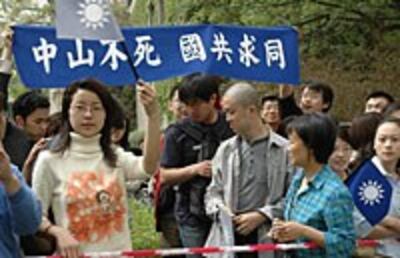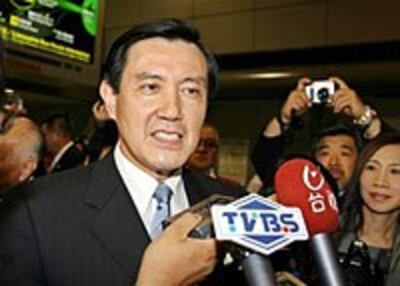
HONG KONG—Chinese national security police are becoming increasingly concerned about the activities of a group of political activists who say they support the policies of Taiwan's Nationalist Party, or KMT, and its chairman Ma Ying-jeou.
While its members deny they are an opposition political party, they have plans to field around 100 'independent' candidates in district and township level elections taking place across China this year and next.
Authorities have already moved to close a chatroom on the popular QQ service, called "The Fans of Ma Ying-jeou" and have interrogated several of its members, according to one member of the group.
The group is also known as the China Pan-Blue Alliance, echoing the nickname of the opposition pro-reunification camp across the Taiwan Strait.
Chatrooms raided
"Ever since the China Pan-Blue Alliance started up...it has been subject to surveillance by national security police and by the local police in many different locations," China Pan-Blue supporter and independent election candidate Wen Yan told RFA's Cantonese service.
Ever since the China Pan-Blue Alliance started up...it has been subject to surveillance by national security police and by the local police in many different locations.
"Their online discussions and chatrooms are frequently raided by police."
Wen, who is standing as a candidate for the Shuixianli constituency in the forthcoming Jianghan district people's congress elections in the central city of Wuhan, says the authorities are so worried about his activities they have hauled him in for questioning, and are offering to buy votes for the official candidate at 50 yuan (U.S. $6.30) apiece.
An official at the election committee denied it had been offering money for votes. "If anyone offers money to potential voters, then that contravenes the Election Law of the People's Republic of China," the official said.
In recent weeks, Alliance members in the northern province of Hebei and in the eastern province of Jiangsu have also been taken in for questioning by police, as has the group's founder, Wuhan-based Sun Bu'er, Wen said.
Plan to mark war
The Wuhan police are apparently concerned about plans to organize a memorial event marking the end of the Sino-Japanese war in 1945.
And in the southwestern city of Chongqing, another activist was held in administrative detention for 20 days and questioned closely about his involvement with the group.
Zhang Qi, a 27 year-old activist who recently put his name forward for local people's congress elections was interviewed July 13 after his release from 20 days' administrative detention for 'illegal activities with an illegal organization.'

"They asked me very detailed questions about the meeting of the China Pan-Blue Alliance that day," Zhang told RFA Mandarin's "Different Voices."
"They said it was an illegal organization. I told them that we used the Internet to publicize our events but that we didn't have an organizational structure," he said. "They said that was for them, not me, to say. I told them it should be decided not by me, or by them, but by the law."
"The activities of the China Pan-Blue Alliance are publicized very openly online," Zhang added. "They have very tight supervision of the Internet now, and they will download and print out all the topics on the forum for filing as evidence in the case of a group like Pan-Blue. The police told me this themselves."
Social stability warning
"They said we weren't spiritual members of the KMT, but mentally ill members...They told us that for a group of young people to be doing the things we were doing wasn't conducive to social stability," he said.
Zhang said police had compared the group of activists with the Chinese legendary Monkey King, Sun Wu-Kong, a symbol of subversion and sly intelligence throughout Chinese culture: "They said, 'you monkeys will not be allowed to create havoc in heaven,'" he recalled.
As rapid economic reforms and a growing gap between rich and poor spark increasing social unrest across China, authorities have been swift to move in on any sign of communication between isolated interest groups.
Local police regularly follow activists who attempt to board trains to take their grievances to central government complaints departments in Beijing, which are now swamped with petitioners on a daily basis.
Anniversaries of emotionally sensitive events, even of a patriotic kind, are feared as a potential focus for public anger at decades of official corruption, for which many have found little hope of redress.
Meanwhile, Wen accused the Jianghan district election committee of offering bribes of 50 yuan (U.S. $6.30) to each person who voted for the officially sanctioned candidate. He said several local residents had confirmed that verbal offers had been made to them, and that they planned to offer their votes to the highest bidder.
A spokesman for China's own KMT, one of the symbolic 'opposition parties and factions' under the control of the Communist Party, said he had never heard of the China Pan-Blue Alliance, nor its founder Sun Bu'er.
"If the Chinese Nationalist Party were to set up such an organization on the Chinese mainland it would be done according to Chinese law," Zhang Ronggong said. "Even those groups set up by Taiwanese investors in mainland China have been approved according to Chinese law."
"I have never heard of this China Pan-Blue Alliance which you speak of, neither among Chinese official groups or among Taiwan investors. There is no Pan-Blue Alliance in the Chinese Nationalist Party," Zhang said.
Taiwan and China have been governed separately since the KMT fled to the island in 1949 after losing a civil war to Mao Zedong's communists on the mainland. The island's "pan-blue" camp supports eventual reunification with China, while the "pan-greens" spearheaded by the Democratic Progressive Party (DPP) want independent statehood for Taiwan.
Beijing has repeatedly threatened to invade Taiwan, should it declare formal independence.
Original reporting in Cantonese by Lee Kin-kwan and in Mandarin by Jill Ku. RFA Cantonese service director: Shiny Li. RFA Mandarin service director: Jennifer Chou. Translated and written for the Web in English by Luisetta Mudie. Edited by Sarah Jackson-Han.
